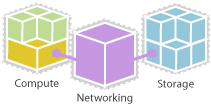
This is first of a two-part post (click here for second post) that is part of ongoing industry trends and perspective cloud conversations series that looks at Dell and their cloud strategy story. For background, some previous Dell posts are found here, here, here and here. Here is a link that has video of the live Dell Storage Customer Advisory (CAP) panel that Dell asked me to moderate back in June that touches on some related themes and topics. Btw, fwiw and for disclosure Dell AppAssure is a site advertiser on storageioblog.com ;).

Depending on your view of what is or is not a cloud service, product or solution, naturally you will then have various opinions of where Dell is at with their cloud strategy and story.
If you consider object based storage to be part of or a component of private clouds or at least for medical, healthcare and related focus, then Dell is already there with their DX object storage solutions (Caringo based).
From a scale out, clustered or grid file system, Dell bought Exanet in a post holiday shopping sale a few years back and has invested in its development having renamed it Fluid File System and initially available as the FS7000 series (EqualLogic) and more recently expanded systems such as the FS8600 (Compellent based), EqualLogic and NX3500 (MD3000 based).

If you view clouds as being part of services provided including via hosting or similar, Dell is already there via their Perot systems acquisitions.
If you view cloud as being part of VDI, or VDI being part of cloud, Dell is there with their tools including various acquisitions and solution bundles.
On the other hand if you view clouds as reference architectures across VMware vSphere, Microsoft Hyper-V and Citrix Xen among others, guess what, Dell is also there with their VIS.
Or, if you view private clouds as being a bundled solution (server, storage, hardware, software) such as EMC vBlock or NetApp FlexPod, then Dell vStart (not to be confused as being a service) is on the list with other infrastructure stack solutions.

How about being a technology supplier to what you may consider as being true cloud providers or enables including those who use OpenStack or other APIs and cloud tools, guess what, Dell is also there including at Rackspace (via public web info).
So the above all comes back to that Dell like many vendors who offer services, solutions and related items for data and information infrastructures have diverse offerings including servers, storage, networking, hardware, software and support.
Dell like others similar to them has to find a balance between providing services that compete with their customers, as well as supplier such as to Rackspace. In this case Dell is no different from EMC who happened to move their Mozy backup service off to their VMware subsidiary and has managed to help define where VCE (and here) and ATMOS fit as products while being services capable. IBM has figured this out having a mix of old school services such as SmartCloud Services (or here), IBM Global Services and BCRS (business continuity recovery services), not to mention newer backup and storage cloud services, products and solutions they have acquired, or OEM or have reseller agreements with.

HP has expanded their traditional focused EDS as well as other HP services along with products being joined by their Amazon like Cloud Services including compute, storage and content distribution network (CDN) capabilities. NetApp is taking the partnering route along with Cisco staying focused for at least now on being a partner supplier. Oracle, well Oracle is Oracle and they have a mix of products and services. In fact some might say Oracle is late to the cloud game however they have been in the game since the late 90s when they came out with Oracle online, granted the cloud purist will call that application service provider (e.g. ASP) vs. today's applications as a service (AaaS) models.
Continue with the second post here, ok, nuff said (for now).
Cheers gs